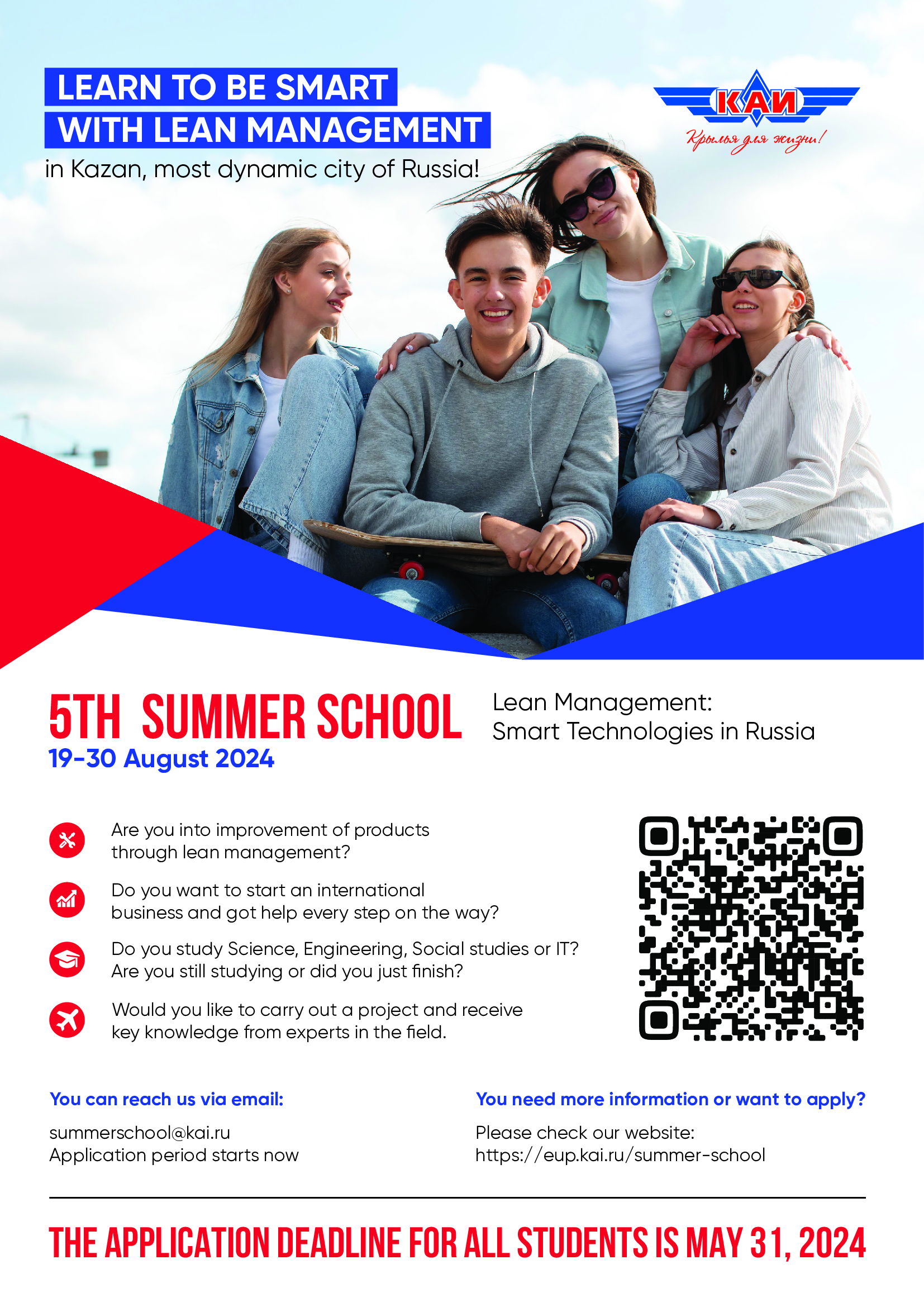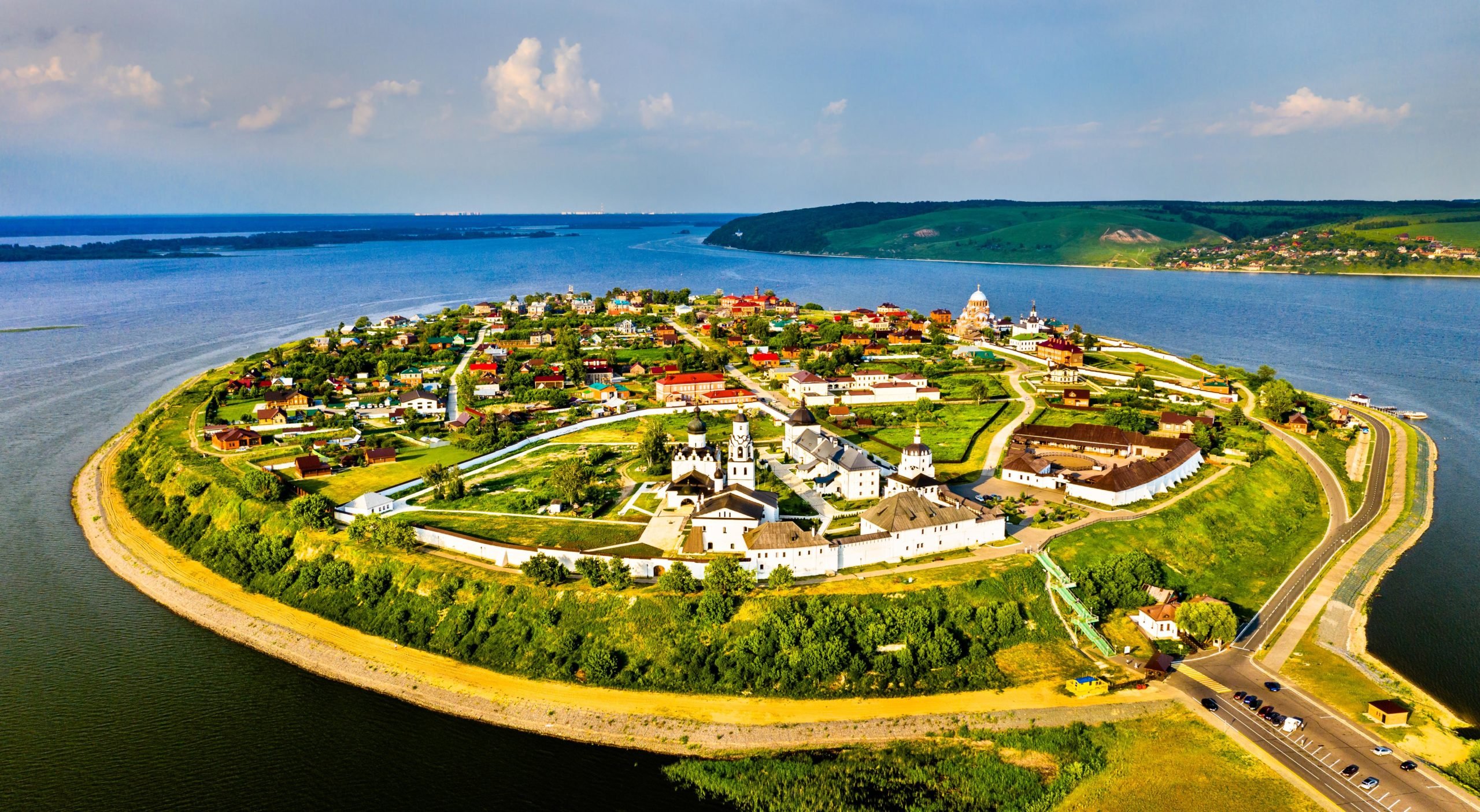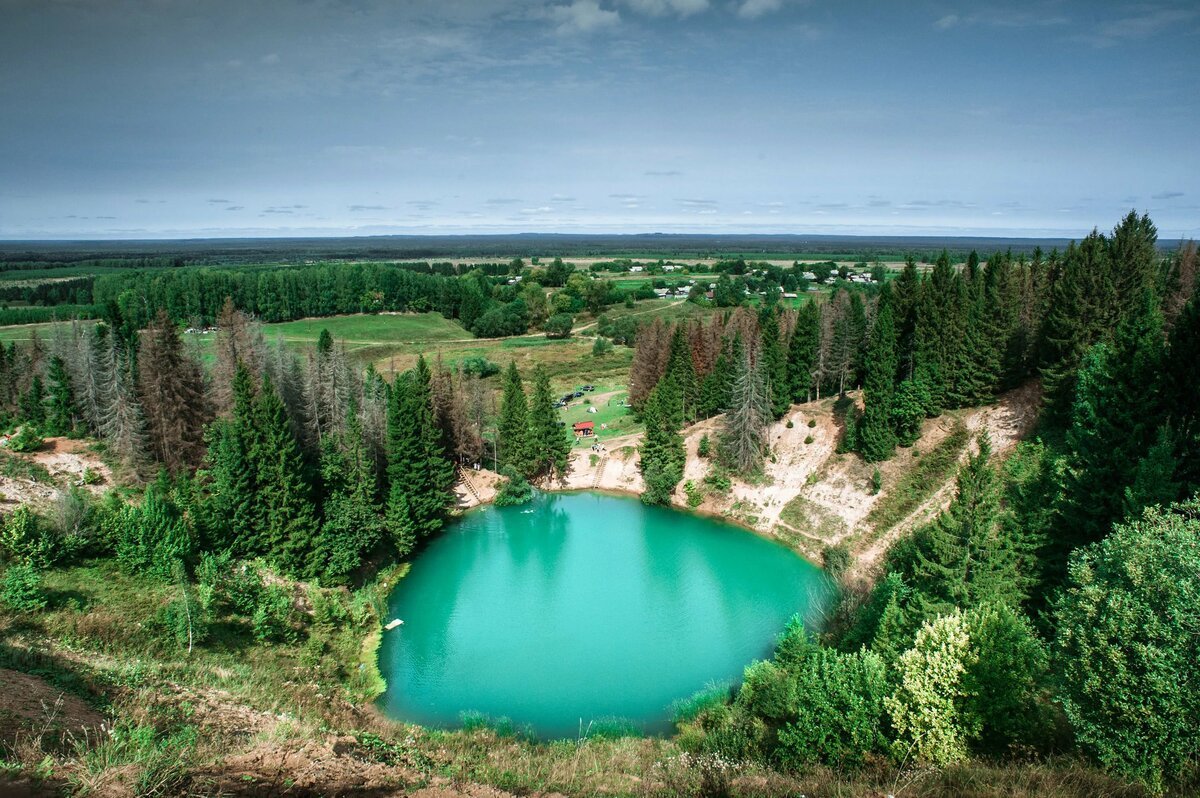 Отображение сетевого контента
Отображение сетевого контента

5th INTERNATIONAL SUMMER SCHOOL, AUGUST 19, 2024 – AUGUST 30, 2024
“Lean Management: Smart Technologies in Russia”
GENERAL INFORMATION
The aim of the Summer school is to introduce students to the technology changes in today’s economy from the manufacturing process until the product comes to the customer. The main topics we will deal with are Project Management, Lean Production, Financial & Marketing, Intellectual Property Management, Network Economy. Throughout the two weeks summer school participants will build their own micro-project and together with the help of the teachers not only gain theoretical knowledge but also dive deeper in the application with their own project and how to improve their “own” production with these subjects.
The rapid development of modern society determines the widespread introduction of various smart systems or individual devices into everyday life. Well-known examples of this are, for example, smart home, smart lock, smart watch, smart phone, etc. As you know, all smart systems are based on the use of information technology, which is also changing rapidly. However, project management skills, including leadership skills, judge and decision making skills, ability to the teamwork, etc. have the great part of importance, especially for achieving project goals.
Rapid changes in the digital economy must occur without significant production losses. Lean production is a management concept based on a constant striving to eliminate all types of production losses. Lean production involves the involvement of each employee in the optimization process and maximum customer orientation. For our students that means, that they will choose products that have a link to smart technologies and can optimize their “own production” using lean management and apply these principals to real life. The context of the project is an international production, what is especially interesting if we think of binational and international productions.
No less important is the area of intellectual property management at the national level as well as in the global context. The launch of a new product on the market requires compliance with the general rules and principles, which are in force in this area. This is especially important in a business that involves the commercialization of products and profit.
This is a global trend that requires a comprehensive rethinking of economic processes that have been established for years, both at the level of individual entities and at the level of national economies. The list of issues requiring a comprehensive solution includes issues from such areas as: digital (smart) production based on the principles of lean manufacturing, e-marketing, e-commerce, digital economy, network economy, etc. In addition, in the context of globalization of economic processes, issues of observance (protection) of copyrights, protection of intellectual property become very important. In this regard, it becomes obvious that for the conditions of the above-mentioned economic structure specialists with specific competences in the above-mentioned areas will be in demand.
LECTURES
The students of our summer school will then think about the financial aspects as well as the huge questions linked to intellectual property. They will also try to promote their products in a digital economy using digital marketing campaigns.
That is why the summer school is proposed consisting of the following basic (subject) modules:
1) Project Management
2) Lean Production
3) Financial & Marketing
4) Intellectual Property Management
5) Network Economy
and also a language module:
7) Russian as a Foreign Language.
Auditory knowledge will be reinforced by visits to enterprises located in Kazan, namely: Center for Scientific and Technical Information of the Republic of Tatarstan (a branch of the Rospatent network), Regional Competence Center, IT Park, Agency for Innovative Development, Innopolis University. Thus, the summer school program will consist of 40% of theoretical classes, 60% of practical classes.
The Summer school modules:
|
Module |
Title |
Content |
|
Module 1 |
Project Management (PM) |
The Project Life Cycle, The Triple Constraint of PM, PM Phases, PM Methodologies, PM Tools, PM Templates, PM Software, PM Certifications |
|
Module 2 |
Lean Production |
Lean Manufacturing, Kaizen, Value Streams, Pull Manufacturing, Mistake Proofing, Quick Changeover, Six Sigma, Lean Accounting, Theory of Constraints, Human Factors |
|
Module 3 |
Financial & Marketing |
Enterprise finance, cost classification, pricing methods, taxes and taxation, investments, enterprise marketing |
|
Module 4 |
Intellectual Property (IP) Management |
Meaning of Intellectual Property Rights (IPR), organization and finance of IPR management, national regulations and special conditions, copyrights, patents, patent families, trademarks, trade secrets, IP agreements, Strategies for protecting IP, assessment and valuation of IP |
|
Module 5 |
Network Economy |
Network production, network innovation, network effects, network freedom, network production infrastructure, consumption patterns in the network economy |
At the end of the school, each participant performs and defends the micro-project and will be able to apply the different areas to a practical case study.
All classes will be held in a modern university building, which has modern laboratories: Quantum Technology, Nanotechnology, Laser Technology, Etc.
In addition, the summer school program includes an interesting cultural program such as excursions to places outside of town and sightseeing of the city.
PRELIMINARY DAILY SCHEDULE OF THE SUMMER SCHOOL
(note: the file in Excel)
OFF-CAMPUS ACTIVITIES
The Summer School pays attention to local languages and cultures (Russian and Tatar) by offering a Russian class for foreign students of 90 min/day. It also includes a variety of activities to explore Kazan, i.e., a city tour and a picnic on the Volga river banks.
Kazan Kremlin
For more than a thousand years of its history, the white-stone, symbolic and legendary Kazan Kremlin has heard almost every language of the world and hosted common tourists, ministers and presidents alike. Imperious-looking and powerful, it calls Muslims to the prayer in mosques and at the same time lets Orthodox church bells ring loud. By becoming a home to numerous museums, it invites guests from all over the planet every day. This architectural and historic monument was rightly included in UNESCO’s World Cultural Heritage List as early as in 2000.

Innopolis
Innopolis (Russian: Иннополис) is a town in Verkhneuslonsky District of the Republic of Tatarstan, Russia, a satellite of Kazan, the capital of the republic. This is the smallest town in Russia with 96 inhabitants according to the 2016 estimate. The basis of the housing stock of Innopolis is 4 blocks of multi-storey apartment houses - 16 houses for 840 apartments - built by the State Housing Fund under the President of the Republic of Tatarstan and intended for leasing to residents of Innopolis and students. As of the end of 2016, there was a kindergarten, a school, an IT lyceum, a sports and medical center, post offices, client offices of AK Bars and Sberbank, a beauty salon, a coffee shop and a supermarket in Innopolis.
Island town of Sviyazhsk
The island town of Sviyazhsk is that same fairy-tale island of Buyan, that magical land which Pushkin wrote about in his story of Prince Gvidon. Everything on the island simply breathes history. People come here to enjoy the truly mythical atmosphere, learn more about the history and admire the local architecture.

The Mari El Republic
Mari El is notable for being one of the last strongholds of organized paganism in Europe. While many of the Mari people have converted to Russian Orthodoxy, a sizable number practice the Marla Faith, which combines Christianity with significant native shamanistic traditions. The Russian and Soviet governments have been suspicious of Finno-Ugric nationalism within Mari El (and Udmurtia), however, and have discouraged the Marla Faith; accordingly, it may be difficult to have any experiences with the Marla Faith while visiting the region. But if you do, you may be lucky enough to experience some of the Mari People's millennia old traditions, like their marriage ceremonies in sacred forest groves.

APPLY NOW!
Application, registration, deadlines:
Application and registration for the 5th Summer School:
Opening date is April 1, 2024.
Deadline for submitting applications is May 31, 2024.
APPLICATION REQUIREMENTS
Masters’ and Bachelors’ general requirements
B.Sc. and M.Sc. students from technical, engineering, socio-economic majors. Preference will be given to students with the background in such fields like economics, business, management, industrial engineering, etc.
Language requirements
As all classes are taught in English, a good (intermediate or higher) level of English (written and spoken) is necessary.
APPLICATION PROCESS:
Please send your application to the summer school office here: summerschool@kai.ru
Please attach the following documents:
1) Filled application form
2) CV
3) Motivation letter (1 – 1 ½ page)
4) Copy of your scanned passport page with a photo, and info about the date and place of issue
Please note!
* Note documents (1-3) should be in English and all documents (1-4) in PDF format.
* Please note! Foreign participants may need to apply for a visa no later than 1 month before the start of the course
The participation fee includes:
PARTICIPATION FEES:
The participation fee is 650 €. The fee is to be paid in cash (in Rubles) on the first day of the summer school. You will be accompanied to the bank to exchange your currency into Rubles.
The fee for students in and from Russia is 8.900 RUB.
Lectures / Lab work
Scripts and copies
Meals (lunch and coffee breaks), please, let us know if you have any dietary restrictions
Accommodation
Free use of the library and internet access
Cultural program*
Excursions*
Experts’ fees
* entry ticket to the bus transfer to and from the tour guide fees are included, unless using public transportation or walking is faster and more convenient option

